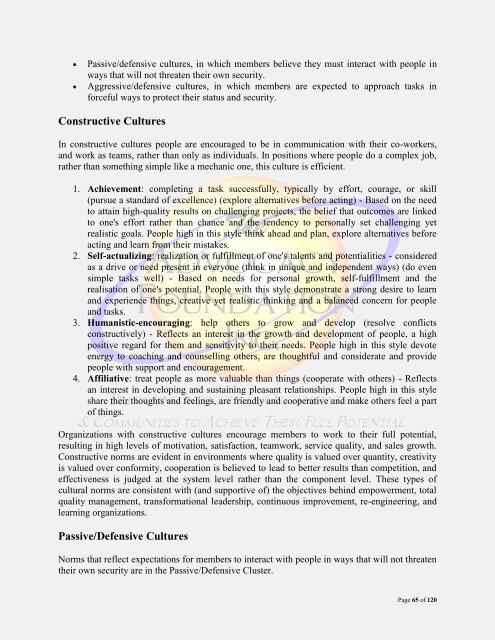Organizational Development - Vol. V, Part II
Organizational Development - Vol. V, Part II
Organizational Development - Vol. V, Part II
Create successful ePaper yourself
Turn your PDF publications into a flip-book with our unique Google optimized e-Paper software.
Passive/defensive cultures, in which members believe they must interact with people in<br />
ways that will not threaten their own security.<br />
Aggressive/defensive cultures, in which members are expected to approach tasks in<br />
forceful ways to protect their status and security.<br />
Constructive Cultures<br />
In constructive cultures people are encouraged to be in communication with their co-workers,<br />
and work as teams, rather than only as individuals. In positions where people do a complex job,<br />
rather than something simple like a mechanic one, this culture is efficient.<br />
1. Achievement: completing a task successfully, typically by effort, courage, or skill<br />
(pursue a standard of excellence) (explore alternatives before acting) - Based on the need<br />
to attain high-quality results on challenging projects, the belief that outcomes are linked<br />
to one's effort rather than chance and the tendency to personally set challenging yet<br />
realistic goals. People high in this style think ahead and plan, explore alternatives before<br />
acting and learn from their mistakes.<br />
2. Self-actualizing: realization or fulfillment of one's talents and potentialities - considered<br />
as a drive or need present in everyone (think in unique and independent ways) (do even<br />
simple tasks well) - Based on needs for personal growth, self-fulfillment and the<br />
realisation of one's potential. People with this style demonstrate a strong desire to learn<br />
and experience things, creative yet realistic thinking and a balanced concern for people<br />
and tasks.<br />
3. Humanistic-encouraging: help others to grow and develop (resolve conflicts<br />
constructively) - Reflects an interest in the growth and development of people, a high<br />
positive regard for them and sensitivity to their needs. People high in this style devote<br />
energy to coaching and counselling others, are thoughtful and considerate and provide<br />
people with support and encouragement.<br />
4. Affiliative: treat people as more valuable than things (cooperate with others) - Reflects<br />
an interest in developing and sustaining pleasant relationships. People high in this style<br />
share their thoughts and feelings, are friendly and cooperative and make others feel a part<br />
of things.<br />
Organizations with constructive cultures encourage members to work to their full potential,<br />
resulting in high levels of motivation, satisfaction, teamwork, service quality, and sales growth.<br />
Constructive norms are evident in environments where quality is valued over quantity, creativity<br />
is valued over conformity, cooperation is believed to lead to better results than competition, and<br />
effectiveness is judged at the system level rather than the component level. These types of<br />
cultural norms are consistent with (and supportive of) the objectives behind empowerment, total<br />
quality management, transformational leadership, continuous improvement, re-engineering, and<br />
learning organizations.<br />
Passive/Defensive Cultures<br />
Norms that reflect expectations for members to interact with people in ways that will not threaten<br />
their own security are in the Passive/Defensive Cluster.<br />
Page 65 of 120

















